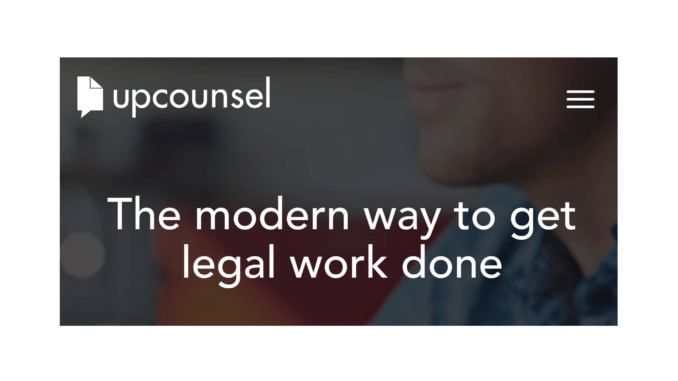
Early yesterday, Artificial Lawyer brought you the news that UpCounsel, a web-based marketplace for legal services, which raised significant funds including $12 million in 2018, is to shut down its site (see below). However, some interesting information has come to light since then, that in many ways makes the company’s decision to close their site from 4 March even more intriguing.
A person who was behind a court action against UpCounsel (also see below for details of the case), namely Raj Abhyanker of RAPC Worldwide, wrote a blog post on their personal site – https://rajthelawyer.com/ceasing-hostilities-cozying-up-to-upcounsel/ – to say the following:
‘Now my law firm, LegalForce RAPC Worldwide, has dropped its lawsuits against UpCounsel, and we have struck an accord in which I now own a small stake in the company.
This was written in 2019.
The blog post covers plenty of detail about the case and then adds: ‘I remain hopeful that UpCounsel’s founders, investors and lawyers will see the benefits of our working together.’
–
Scroll forward to late today and Homebrew, one of the investors in UpCounsel, said in a tweet on Monday evening following the site closure news:
‘One of our 1st investments @UpCounsel connected independent lawyers w SMB & Enterprise customers. Watching them grow helped shape our understanding abt labor marketplaces. Today they closed their site but I think you’re going to like what they’re doing as part of @LinkedIn‘
And then also on the same evening this was followed by a tweet from Raj Abhyanker stating that UpCounsel was not being acquired by LinkedIn.
Raj Abhyanker also in his recent twitter comments – (https://twitter.com/rajpatent/with_replies) – suggested, to phrase it very politely, that he had several issues with the co-founders of UpCounsel, Mason Blake and Matthew Faustman.
Artificial Lawyer has contacted UpCounsel for further comment.
—
As to what this all means, the only thing we can say for certain is that UpCounsel intends to close its site. Clearly though there is plenty going on in what appears to be a fluid situation.
—
Previous aspects of the story, including the statement from UpCounsel (directly below) –
‘We want to thank you for your continued support since we first started UpCounsel in 2012. It has been a delight to work with each of you along the way, building innovative products to make the legal experience better. Pursuing our mission of creating a remarkable legal experience was made possible because of you. As founders we are humbled and honored that you came on this journey with us.
Pursuant to a decision approved by our board of directors and shareholders, the UpCounsel website will be shut down permanently on March 4, 2020. At that time you will no longer be able to login to your account. In connection with the site shutdown we will be deleting all account information and any data associated with your usage of UpCounsel in accordance with best data practices. If you wish to retrieve a copy of your data, please contact support@upcounsel.com.
We recommend and encourage you to continue working with your lawyers. This does not disrupt your attorney relationships or interfere with the progress of any legal project. Please reach out to your lawyer to discuss steps on managing this transition and feel free to contact us with questions as well.
It is with a heavy heart that we deliver this news and understand that this abrupt announcement will come as a shock to some of you that have come to rely on UpCounsel. Our team will be available as usual to answer any questions you may have leading up to the site’s shutdown on March 4th. We will share further details with you as they become available.
Best,
Mason Blake & Matthew Faustman
UpCounsel Co-founders.’
–
Without official confirmation it’s hard to point a finger at one cause for this. But we can see that:
Back in 2016, the State Bar of California sent out a notification to the effect that:
‘Rule 1-320 of the California Rules of Professional Conduct prohibits, with certain limited exceptions, the sharing of legal fees between a member of the State Bar of California and a non-attorney. The rule also prohibits a member from compensating a person or entity for the purpose of recommending or securing employment of the member by a client, or as a reward for having made a recommendation resulting in employment of the member.
While at this time there does not appear to be the level of conduct that would likely lead to the imposition of discipline in the State Bar Court, we are concerned that a percentage-based processing fee to be paid to UpCounsel, Inc., would constitute an improper sharing of legal fees.’
However, the company went on to thrive and raised money, so we have to see this in context and clearly some kind of ongoing working solution would appear to have been found – at least until the present day.
But, then later in 2018 UpCounsel faced a law suit filed also in California claiming it was operating unfairly. This was filed by LegalForce RAPC Worldwide. It is understood – see above – that this case was then settled last year.
The case:
On September 11, 2018, plaintiffs filed their FAC, asserting therein three claims for relief: (1) “False Advertising and Unfair Competition [under] the Lanham Act, 15 U.S.C. § 1125(a)”; (2) “California False & Misleading Advertising [under] Cal. Bus. & Prof. Code § 17500 et seq. [(‘FAL’)]”; and (3) “California Unfair Competition in Violation of Cal. Bus. & Prof. Code § 17200 et seq. [‘UCL’].”
1 Trackback / Pingback
Comments are closed.